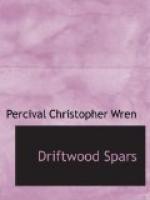Had Moussa Isa lived a few centuries earlier, been of another colour, and swanked around in painful iron garments and assorted cutlery, he would have been highly praised for his fine and proper spirit. Poet, bard, and troubadour would have noted and published his quickness on the point of honour. Moussa would have been set to music and have become a source of income to the gifted. He would have become a Pillar of the Order of Knighthood and an Ornament of the Age of Chivalry. A wreath of laurels would have encircled his brow—instead of a rope of hemp encircling his neck.
For such fine, quick, self-respecting Pride, such resentment of insult, men have become Splendid Figures of the Glorious Past.
Autres jours autres moeurs.
How many people called him Hubshi, we know not; but we know, from his own lips, of the killing of some few. Of the killing of others he had forgotten, for his memory was poor, save for insult and kindness. And, having caught and convicted him in one or two cases the appointed servants of the British Empire first “reformed” and then slew him in their turn—thus descending to his level without his excuse of private personal insult and injury....
The scars on Moussa Isa’s face with the hole in his ear were connected with one of his very earliest memories—or one of his very earliest memories was connected with the scars on his face and the hole in his ear—a memory of jolting along on a camel, swinging upside-down, while a strong hand grasped his foot; of seeing his father rush at his captor with a long, broad-bladed spear, of being whirled and flung at his father’s head; and of seeing his father’s intimate internal economy seriously and permanently disarranged by the two-handed sword of one of the camel rider’s colleagues (who flung aside a heavy gun which he had just emptied into Moussa’s mamma) as his father fell to the ground under the impact and weight of the novel missile. Though Moussa was unaware, in his abysmal ignorance, of the interesting fact, the great two-handed sword so effectually wielded by the supporter of his captor, was exactly like that of a Crusader of old. It was like that of a Crusader of old, because it was a direct lineal descendant of the swords of the Crusaders who had brought the first specimens to the country, quite a good many years previously. Indeed some people said that a few of the swords owned by these Dervishes were real, original, Crusaders’ swords, the very weapons whose hilts were once grasped by Norman hands, and whose blades had cloven Paynim heads in the name of Christianity and the interests of the Sepulchre. I do not know—but it is a wonderfully dry climate, and swords are there kept, cherished, and bequeathed, even more religiously than were the Stately Homes of England in that once prosperous land, in the days before park, covert, pleasaunce, forest, glade, dell, and garden became allotments, and the spoil of the “Working"-man.




